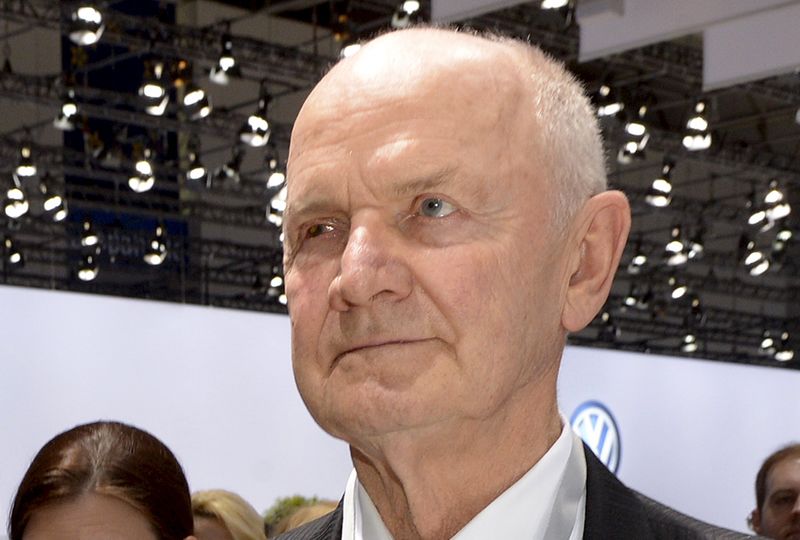BERLIN (Reuters) - Investors hope that Volkswagen (DE:VOWG_p) will be able to revive profitability at its core division, cure underperformance overseas and bury lingering plans for acquisitions after the resignation of Chairman Ferdinand Piech.
Piech, the mastermind of VW's global expansion and a towering figure at the German group for more than two decades, stepped down on Saturday after losing a showdown he had provoked with Chief Executive Martin Winterkorn.
Almost 80 percent of VW investors expect the carmaker's stock market value to increase after Piech's departure as it may help unlock greater earnings potential at the 12-brand group, a survey by advisory firm Evercore ISI showed.
Preference shares in Volkswagen rose more than 5 percent, nearly making up for a slide in value during the two-week boardroom battle. The shares were trading up 4.2 percent at 242.80 euros as of 1224 GMT (8.24 a.m. ET).
The exit of Piech, who spearheaded VW's campaign to make everything from motorcycles to 40-tonne trucks, also curbs the risk of purchases while VW is cutting billions of euros of costs at its core brand and revamping operations, Evercore ISI said.
"Piech's departure is good news for VW," said Evercore ISI analyst Arndt Ellinghorst, who raised his recommendation on the stock to "buy" from "hold". "VW has a better chance to turn itself into a more profitable and valuable business."
Empire-building at VW, which only a year ago took full control of Swedish truckmaker Scania, should play a smaller role in the post-Piech era, analysts said, noting that Piech had appeared keen to buy Fiat Chrysler (NYSE:FCAU)'s
Under Piech's nine years as CEO, VW bought ultra-luxury brands Bugatti, Bentley and Lamborghini, integrated Spanish volume unit Seat and raised its stake in Czech division Skoda.
"The sheer complexity of VW is starting to hit the wall," said Ingo Speich, a fund manager at Union Investment which holds 0.6 percent of VW preference shares. "There are numerous trouble spots at VW that urgently need to be tackled now."
The relentless push for scale under the once-close Winterkorn-Piech alliance, which led VW to almost double sales to 202 billion euros last year and nearly triple group profit, has papered over structural shortcomings at the German behemoth, analysts have said.
Winterkorn is aiming to revive flagging profitability at the core namesake division, pushing plans to increase cost savings to 5 billion euros ($5.42 billion) a year by 2017 as the group sheds its volume-driven focus.
"More than 600,000 workers build slightly fewer vehicles than market champion Toyota (T:7203) with 350,000 workers," wrote Ferdinand Dudenhoeffer, head of the Center of Automotive Research at the University of Duisburg-Essen. "The problems strike at the heart of VW."
To be able to keep generating cash to fund its global operations, including upgrades and additions to a fleet of more than 310 models, VW is shifting focus to earnings quality at the cost of abandoning a long-stated goal of becoming global sales champion.
With the recovery in core European markets gaining traction, VW's group profit margin probably climbed to 6.2 percent in the first quarter from 6 percent a year earlier, an analyst poll showed ahead of Wednesday's results.
"Scale is important but the push for volume is anything but the sole parameter of management policy," a member of VW's 20-seat supervisory board told Reuters on Monday on condition he not be named because the matter is confidential.
There are signs that VW's top management is starting to adjust strategy to overcome shortcomings in foreign markets.
Two company sources familiar with VW's product strategy told Reuters preliminary talks with China's Great Wall (SS:601633) had been held this year to explore the possibility of joint development of low-cost vehicles to tackle VW's chronic weakness in southeast Asia and India.
Another company source said VW was busy working on a small SUV for Brazil, where such models are selling well, and is aiming to present a new concept car next year.

"VW has various trouble spots and the door now appears open for much needed change," said Frankfurt-based Bankhaus Metzler analyst Juergen Pieper.